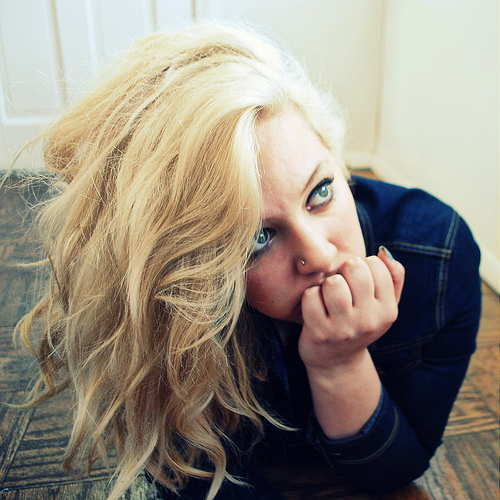Our culture is plagued by anxiety.
We are a generation defined by our fears, our fidgets, and our need for instant gratification and validation—and sadly, we are suffering.
Our collective, societal anxiety may be reflected in endless newsfeed articles, hashtags, and even tattoos or comics. It may stream on Netflix or ticker across the bottom of 24-hour news screens. We may even satirize it on t-shirts in an attempt to make light of our pain, but make no mistake—our individual agony is real, and our terror of our own fear, of the unknown, of shame, guilt, and rejection isn’t a joke when we’re gripped tight in anxiety’s vice.
My anxiety can paralyze me, and what many people who don’t experience this don’t understand is that anxiety isn’t just racing thoughts. It’s more than worrying. It’s more than my over-planning and my need for extra reassurance.
Sure, it manifests itself in those things too, but for me, the most terrifying part of my anxiety disorder is the physical sensations that accompany my uncontrolled mind. I feel the anxiety in my body. It is as if a virus of fright has infected my cells, making me literally feverish, causing cold sweats, nausea, abdominal pain, rapid heart rate, chills, and body aches.
When you feel like that, you become desperate for relief. All you want is to be well, and you will try anything to heal.
I’ve done all sorts of strange things to feel better—and sometimes, although I try to avoid it, I have to resort to medication because that is the safest and most responsible choice. But I don’t want to be dependent on dangerously addictive benzodiazepines to find relief, so I’ve worked hard to learn techniques to calm my central nervous system naturally and to retrain my thoughts about my anxiety.
Exercise helps, as does staying up later at night. If I am not tired enough, I tend to have insomnia, or I wake up and have debilitating panic attacks in the middle of the night. Exercise and intentionally delaying sleep has actually helped to wear me out enough that I have reduced my symptoms. Ice cold showers can also shorten my panic attacks, though this does take a certain amount of willpower to accomplish.
But recently, I found one trick that has really worked to stop my anxiety. In a session with an intuitive healer, I was told that whenever I find myself in the middle of a panic or anxiety attack that I must stop whatever unhealthy thing I’m doing (in my case it’s usually crying on the bathroom floor, but it’s different for everyone) and start writing. It doesn’t matter what or where. Sometimes I drag out my laptop, and sometimes I scribble in a notebook. I’m not writing to be read, so I don’t have to worry about editing. I just write stream of consciousness.
And it works—but I’m not telling you that writing will work for you. It’s not the act of writing itself that soothes my fear. It is more than that.
However, I felt better when I began to practice this technique, but I wasn’t satisfied. I wanted to understand how and why it worked. That’s when I realized that this is something much bigger than putting words to paper.
This is about reclaiming my power.
To calm your anxiety, you must reclaim your power.
My theory about how this works is that when we have anxiety, we feel out of control. We are scared because we feel powerless, and then we get trapped in a mental vortex of fear and more fear. When we’re stuck in the fear cycle, we have to break it by finding a way to feel strong, powerful, and in control again.
Writing works for me, because when I write, I feel confident, secure, and in control. It also helps to focus my mind on something else and provides a distraction from the anxiety.
What works is different for everyone. You have to find that one thing that makes you feel powerful. For many people, it’s yoga. It can be going to the gym too—any kind of exercise is excellent, which makes sense because physical strength can translate to mental strength, and we all feel better about ourselves when we move our bodies.
Your power could lie in your creativity. Perhaps you feel in charge when you make art, or when you cook, or when you garden. I happen to know someone who occasionally weeds and plants by moonlight at three in the morning when his mind races—who cares? Don’t judge yourself. Do what feels good in the moment, regardless of conventions. Allow yourself that freedom in order to get better.
Does building, boating, or volunteering bring you peace? Do those things when anxiety pounces on you. Some people feel powerful at their jobs, so if you’re having a difficult time with anxiety, lean in to your work and make great things happen there for a little while. Get out that new project and start problem solving and researching. (Of course, if you’re work is what is triggering the anxiety, then that isn’t what will make you feel the most powerful, so do something else in that case.)
The trick is figuring out what activity makes you feel like your most confident, authentic self. For me, it’s writing, but that is only one of infinite possibilities. It’s different for everyone. I know a woman who feels in charge when she cleans, so she deals with her anxiety attacks by getting out the mops and sponges. Like I said before, it doesn’t matter as long as it works for you.
My mother recently told me that when she wakes up at night with heart palpitations and fear-induced nausea, she remembers that she can’t lie in bed and succumb to the panic. She gets up and starts drawing up detailed plans for decorating houses. Interior design is her thing. She is talented at it, so when she comes up with decorating schemes she feels like her most badass self—the version of her that can best defeat her anxious feelings.
If you have anxiety, know that you are not alone, even if it seems like you are. Some of us are wired this way, and unfortunately, we live in a culture of fear that exacerbates our natural tendencies. But all hope is not lost. There are techniques that work. They probably won’t cure you forever, but they can certainly help provide relief or shorten the duration of an anxiety attack.
This technique works pretty well for me. Try it and see if it helps you as well—and if not, don’t give up on reclaiming your power or on finding what makes you feel strong and in control.
~
Author: Victoria Fedden
Image: Flickr/Holly Lay
Editor: Yoli Ramazzina
Copy Editor: Nicole Cameron
Social Editor: Callie Rushton









Read 0 comments and reply